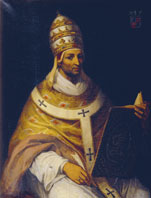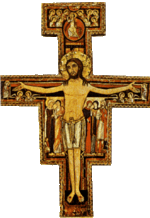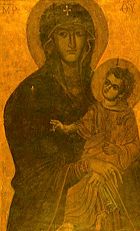Pope John XXII
- See also: Pope John (numbering)
| John XXII | |
 |
|
| Papacy began | August 7, 1316 |
|---|---|
| Papacy ended | December 4, 1334 |
| Predecessor | Clement V |
| Successor | Benedict XII |
| Birth name | Jacques Duèze or d'Euse |
| Born | 1249 Cahors, France |
| Died | December 4, 1334 Avignon, France |
| Other popes named John | |
Pope John XXII (1249 – December 4, 1334), born Jacques Duèze (or d'Euse), was pope from 1316 to 1334. He was the second Pope of the Avignon Papacy (1309-1377), elected by a conclave in Lyon assembled by Philip V of France. Like his predecessor, Clement V, he centralized power and income in the Papacy, living a princely life in Avignon . He opposed Louis IV of Bavaria as emperor, and Louis in turn invaded Italy and set up an antipope, Nicholas V. Pope John XXII also faced controversy in theology involving his views on the Beatific Vision.
Contents |
Biography
The son of a shoemaker in Cahors, Jacques Duèze studied medicine in Montpellier and law in Paris.
The death of Pope Clement V in 1314 was followed by a sedisvacancy of two years, due to disagreements between the cardinals, who were split into two factions. After two years, Philip V of France (1316–22) finally in 1316 managed to arrange a conclave of twenty-three cardinals in Lyon. This conclave elected Jacques Duèze, who took the name John XXII and was crowned in Lyon. He set up his residence in Avignon rather than Rome, continuing the Avignon Papacy of his predecessor.

John XXII involved himself in the politics and religious movements of many European countries in order to advance the interests of the Church. This made him a very controversial pope at the time.
Before John XXII's election a contest had begun for the imperial crown between Louis IV of Bavaria (1314–47) and his opponent, Frederick I of Austria (1308–30). John XXII was neutral at first; but in 1323, when Louis IV had won and became Holy Roman Emperor, the Guelph (papal) party and the Ghibelline (imperial) party began a serious quarrel. This was partly provoked by John XXII's extreme claims of authority over the empire and also partly by Louis IV's support of the spiritual Franciscans, whom John XXII condemned for their insistence on evangelical poverty and their belief that mendicant friars would replace the priesthood and sacraments of the Church. Louis IV was assisted in his doctrinal dispute with the papacy by Marsilius of Padua, and later by the British Franciscan friar and scholar William of Ockham. Louis IV invaded Italy, entered Rome and set up Pietro Rainalducci as antipope Nicholas V (1328–30). The project was a fiasco. Guelphic predominance at Rome was later restored, and Pope John excommunicated William of Ockham. However, Louis IV had silenced the papal claims, and John XXII stayed the rest of his life in Avignon.
Pope John XXII was involved in a theological controversy involving the Beatific Vision. Beginning before he was pope, he argued that those who died in the faith did not see the presence of God until the Last Judgment. The point is important to Catholics, since if the dead are not in the presence of God, then the whole idea of prayers to the saints would seem to be undermined. John XXII continued this argument for a time in sermons while he was pope, although he never taught this in official documents. He eventually backed down from his position, and agreed that those who died in grace do indeed immediately enjoy the Beatific Vision.
Despite holding for many years a view widely held to be heretical, John XXII is not considered a heretic because in his day the doctrine he had contradicted had not been formally defined by the Church, a lacuna that his successor, Pope Benedict XII (1334–42), immediately filled by the encyclical Benedictus Deus, which formally defined this doctrine as part of Church teaching.
Pope John XXII was also an excellent administrator and did much efficient reorganizing.
John XXII has traditionally been credited with having composed the prayer 'Anima Christi, sanctifica me...', which has come down to us in English as 'Soul of Christ, sanctify me...' and as the hymn, 'Soul of my Saviour, sanctify my breast'.
On Sunday 27th March 1329 John XXII condemned many writings of Meister Eckhart as heretical in his papal bull In Agro Dominico.
Miscellaneous
He is frequently discussed in Umberto Eco's The Name of the Rose, and is also featured in Maurice Druon's series of historical novels The Accursed Kings.
The previous pope named John was Pope John XXI. The last pope named John before that was Pope John XIX (1024–32), who was additionally really only the eighteenth pope named John.
References
- Patrick Nold, Pope John XXII and his Franciscan Cardinal: Bertrand de la Tour and the Apostolic Poverty Controversy (Oxford, 2003)
- Guillaume Mollat, The Popes at Avignon (Thomas Nelson and Sons, 1963), 9-25
External links
| Roman Catholic Church titles | ||
|---|---|---|
| Preceded by Clement V |
Pope 1316–34 |
Succeeded by Benedict XII |
|
||||||||||||||||
|
|||||||||||||||||||||||||||||||||||||||||||||
|
|||||||||||||||||||||||||||||||||||||||||||||

